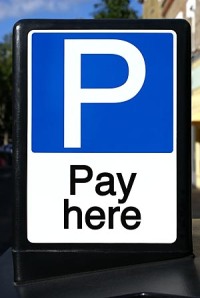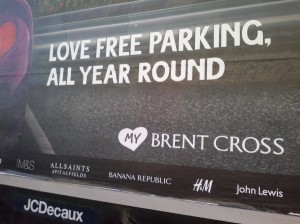 Parking in town centres is a particularly thorny issue for me. As a Green I believe that we should curtail car use, especially in congested cities. But as a town centre retailer I know that cars remain the preferred choice of travel for the vast majority of shoppers, and as a pragmatist, I see that we need to balance the needs of local commerce with the modern world’s addiction to the internal combustion engine.
Parking in town centres is a particularly thorny issue for me. As a Green I believe that we should curtail car use, especially in congested cities. But as a town centre retailer I know that cars remain the preferred choice of travel for the vast majority of shoppers, and as a pragmatist, I see that we need to balance the needs of local commerce with the modern world’s addiction to the internal combustion engine.
Parking has also been something of a luke-warm potato for local authorities for a while now. Told as they were by the last Labour government to push up the price of town centre parking, many of them saw this as a way of offsetting the swingeing cost cuts now being imposed by a government of a different hue. This has laid the foundations for cost hikes by many a cash-strapped council, and the opportunity to make a political point into the bargain has also not been lost on them, in particular by councillors in Oxfordshire where I’m based.
An RAC survey recently reported that councils taking Labour’s advice to heart have raked in some pretty impressive surpluses as a result. Oxfordshire alone netted a whopping £7.52M last year with the city centre trousering £4.56M after a 15% increase in charges over two years.
The predominantly Labour run city council, points to this as a successful part of a low carbon Oxford policy, something which I support in principle. But as a city centre retailer, I simply see them jacking up parking costs under a nebulous green smokescreen, with little concern for the impact this has on my small business. Whatever the true motivations, it’s inarguable that current policy does little to generate widespread consensus for a business friendly, green agenda.
The same can be said for the other side of the argument. Communities Minister Brandon Lewis recently engaged in an acrimonious and unedifying exchange on Twitter with Labour’s Hilary Benn over claims about their previous guidance to local authorities. Labour’s rebuttal saw them accusing Conservative councils of making more money from parking than Labour authorities, based on figures that are still hotly debated. Whatever the true position is, I imagine most local government officers would have found these criticisms a lot easier to swallow had Brandon Lewis not gone on to announce a further budget cut of 2.9% shortly after his exchange with Benn.
Worryingly, the RAC claims that Oxford is only 32nd out of 353 councils in terms of surpluses being made from parking across the country. Suggesting that many local authorities are now just as dependent on the teat of the parking cash cow as motorists are on the petrol pump. Stories of increases are now emerging on an almost daily basis across the country as councils are placed under further pressure to balance the books.
Underlying effect
 Taken in isolation, parking seems less consequential than pressures such as spiralling business rates or rents. But the underlying effect of high charges and swingeing fines are just as corrosive to the goodwill we all work hard to foster. Any retailer will tell you that parking is vital to their business and they feel the pain when this is made more expensive or less available.
Taken in isolation, parking seems less consequential than pressures such as spiralling business rates or rents. But the underlying effect of high charges and swingeing fines are just as corrosive to the goodwill we all work hard to foster. Any retailer will tell you that parking is vital to their business and they feel the pain when this is made more expensive or less available.
Those that question the advantages and disadvantages of parking provision only have to ask why, if it’s such a side-issue, do out of town shopping centres and even some city centre malls invariably include some element of free or cheap parking as part of their DNA? It’s because they know that, given the choice, most car borne visitors will gravitate to the areas that offer the best deal on parking and access, leaving towns where parking is restricted or overpriced playing on a distinctly bumpy playing field.
Convenience
People expect the convenience that easy parking offers and feel very much used by any town that fleeces them for the same service. Most will only be caught out once and then choose to shop elsewhere in future, even if that involves significantly more travelling. And let’s not forget that by pushing shoppers to take longer journeys to reach further flung destinations, we’re increasing the carbon emissions that we’re all supposedly trying to prevent.
Most retailers and restaurateurs have come to regard themselves as the bait in the parking trap and look on with impotent dismay at the damage being wrought on a town’s reputation by local councils with an apparent disregard for the principles of supply and demand. Decisions about parking provision are usually taken in spite of the businesses that rely on them, rather than in consultation with them.
Yet as businesspeople we’re pragmatists and understand the fiscal imperatives. For example, many would be happy to be involved in some sort of parking validation scheme, whereby we contribute to the cost of a customer’s parking if they make a purchase. This is a well established practice in the USA and yet is something that is rarely available here.
Solutions
In the end though, we have to tackle the environmental damage being caused by cars and the most sensible compromise in the cases of over-congested cities is the excellent Park & Ride concept. Even though research in Cambridge has raised doubts about how much reduction in car use they contributed to, Park and Ride is usually pointed to by campaigners as a good first step towards car free cities. This has to be backed wholeheartedly by the local authority though and be integrated as part of an overall strategy that both encourages visitors to the town and ensures they leave their cars on the outskirts.
 Here Oxford fares rather miserably again. The council has of late chosen to treat the P&R facility as cash generator in it’s own right. After successive hikes in bus fares and the introduction of a parking fee as well, the cost of short term parking is now roughly equivalent to the cost of parking in the city centre for the first few hours. Such a shame that after leading the way as one of the first such schemes in the country, the council has basically reneged on the bargain with motorists who had hitherto been persuaded to leave their car behind. An example yet again of an ostensibly green policy being perverted as a means of raising cash off the backs of motorists, shoppers and retailers.
Here Oxford fares rather miserably again. The council has of late chosen to treat the P&R facility as cash generator in it’s own right. After successive hikes in bus fares and the introduction of a parking fee as well, the cost of short term parking is now roughly equivalent to the cost of parking in the city centre for the first few hours. Such a shame that after leading the way as one of the first such schemes in the country, the council has basically reneged on the bargain with motorists who had hitherto been persuaded to leave their car behind. An example yet again of an ostensibly green policy being perverted as a means of raising cash off the backs of motorists, shoppers and retailers.
Cities can also be made more pedestrian friendly in themselves. Living Streets, a charity focussing on improving pedestrian usage of cities and town centres, published a report last year that suggested people on foot spend significantly more than those who travel to an area by car. This of course relies again on sympathetic urban planning and a good local residential base. It’s a model that has great merit in many circumstances, but in terms of larger cities who need to attract people from farther afield to justify their higher overheads, it may not be as workable.
A radical idea?
Another option I’ve proposed in the past is a compulsory national parking tariff where public and private parking areas would be legally obliged to charge for parking at a rate set by central government, calculated in a similar way to business rates, depending on location and amenity. This would have to be charged direct to motorists and not offset by mall landlords against service charges to tenants. Such a scheme could generate funds from all locales and enable councils to level the costs of parking in their districts, thus reducing the bias towards shopping centres. It would be a tricky thing to implement, but it might be an interesting exercise to at least consider.
Repeated studies, reports and polices have sought to address the issue of parking. Many have agreed that it’s one of the most important factors underpinning high street revival. Yet neither local or national government have seriously grasped the nettle and demonstrated a willingness to sympathetically combine the competing pressures of local finance, business and environmentalism into a coherent policy.
Ultimately the answer to parking, our reliance on car usage, and ways of encouraging pedestrians back into town centres has to be tackled on a holistic basis across the country. It should be seen as part of a commercial eco-system in itself, along with the businesses and services that depend on encouraging visitors to particular areas.
It’s most likely that the answer will lie in a combination of approaches, but it’s certain that it’s not to be found in simply changing a tariff notice and waiting for the obliging motorist to magic away the impecuniosities of local government. That’s an idea that’s already overstayed it’s allotted time, and for which there’s eventually going to be a hefty penalty due from all of us.
